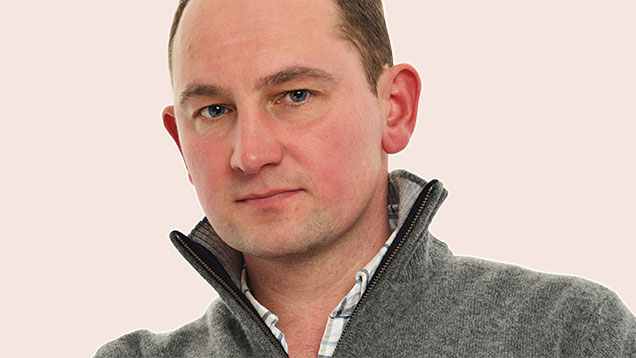Opinion: High-tech progress plays into big business’ hands

There are two main companies that provide computer software for storing field records on a farm. One of these is owned by Farmers Weekly‘s parent company and the other one isn’t.
I am about to write about the other one. You should suspect foul play if this column has been replaced by that image of a girl playing noughts and crosses with a creepy clown that used to appear on the BBC when the TV transmitter broke.
I appreciate that if you are an older reader, computerised record-keeping is a subject that may not interest you; I put in the 1970s test card reference for your benefit. You might want to stop reading now, though, and turn to the classified ads.
I have tried to embrace computerisation on our farm. We have used CropWalker FM from Muddy Boots to record crop data for at least the past 10 years; we use it to share information with our agronomist, to record chemical and fertilisers applications and to double check safe harvest intervals.
This is all done from a desktop PC in the farm office. We are still recording chemical applications in a notebook in the sprayer and then transcribing it.
In many ways, the notebook is the best bit of that whole system. The pen never needs a software update, the notepad always seems to work in a power cut and you don’t have to scroll through a drop-down menu of made-up words such as “canola” and “soy” every time you want to record something.
What do you think about this topic? Have your say on our website forums.
I don’t want you to think that I am anti-technology. Charlie Flindt supplies that market very well already and we opinion writers are always very careful not to stand on one another’s prejudices. I can see the merits of computerisation, but I have always felt that we weren’t really deriving the full benefit from them here.
This is why Chris, my cousin who looks after our crop production, and I went to be trained to use Muddy Boots’ new product, Green Light, this week.
This new system works on an iPad, so now we will be able to make records, including photographs and GPS references, as we go along.
It is a “cloud-based” system, which means we can all access and amend the same data from different computers.
This crazy talk about “clouds” actually means it is stored on a giant system somewhere else, maybe Birmingham, I’m not sure, I didn’t understand that bit. I don’t even know who owns that system. This is a worry since it’s unlikely to be a sweet old granny.
The development of “cloud-based” computing and GPS equipment means we are entering an age where everything will be traceable.
Undoubtedly this will lead to efficiency and easier management for farmers. It will also mean that information can and will be shared between businesses with greater accuracy and frequency.
Tractor manufacturers will know where their machines are working and what they are doing. Agrochemical companies will know where and how we are using their products. Supermarkets and statutory bodies will be able to conduct audits on a live basis and analyse our businesses from afar.
Although such transparency has much to commend it, there is a very significant potential disadvantage, too. The handful of organisations that currently dominate global agriculture and control farmers’ profitability will be able to do so even more effectively in the future.
Matthew Naylor farms 162ha of Lincolnshire silt in partnership with his father, Nev. Cropping includes potatoes, vegetables, cut flowers and flowering bulbs. Matthew is a Nuffield scholar.

